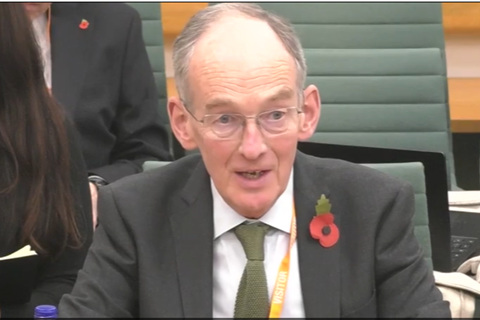Sir Andrew McFarlane gave notice of his departure this week after seven years in the role. He is not going to go quietly, as he proselytised to MPs about problem-solving courts

The president of the Family Division told MPs on Tuesday that he will step down in six months. Though it was perhaps too soon to deliver a valedictory message, Sir Andrew McFarlane was refreshingly forthright. He even fretted at one stage that he may have ‘overstepped the mark’.
Funding cuts, problem-solving courts and a new era of transparency were among the topics that the judge tackled before a Commons justice committee session on family court reform.
Removing legal aid came up, too. ‘The volume [of cases] went up after legal aid was largely removed [by LASPO in 2013], because litigants in person were not meeting solicitors who were saying “come on, you do not want to go to court about that”,’ he said. ‘The [public] perception may be that the lawyers were generating the work, but the statistics show it was the other way around.’
McFarlane also bemoaned the underuse of the family drug and alcohol court (FDAC) concept pioneered in London back in 2008 by the late district judge Nicholas Crichton. The president has previously called for an FDAC scheme in every court.
‘All the research shows that every £1 spent reaps £2 or £3 benefit,’ he told the committee. But because of ‘haphazard’ funding, access to an FDAC court remains a ‘postcode lottery’.
The judge added: ‘I have got to tread carefully, chair, because I am a judge. But it does occur to me that the social benefit of using the court as a moment in someone’s life for intervention, with the judge as a parental figure, does achieve massive change for those individuals. Their lives turn around.’ This should be of relevance across government, he stressed.
‘The MoJ do their bit by providing the courtroom and the judge, but it is the Home Office that must have interest in this, the Department of Health, the Department for Education.
'The social benefit of using the FDAC as a moment in someone’s life for intervention, with the judge as a parental figure, does achieve massive change for those individuals. Their lives turn around'
Sir Andrew McFarlane
‘The reason I am passionate about this is, although it “says on the tin” drugs and alcohol, I understand that [in] nearly every case, an underlying feature is domestic abuse. These individuals are serially victims of horrid, sustained domestic abuse. Turning to drugs and alcohol is a coping mechanism.
‘The professionals working in FDAC say, we often have to address the domestic abuse first, before we can allow the individual to have confidence to move on. Well, if that is right, then it is a domestic abuse facility to address domestic abuse. All the more reason, then, for it to be taken seriously in the campaign (concerning) violence against women and girls.’
Reflecting on his seven-year tenure, the president said: ‘Looking back, it has been a time of enormous change. We have discussed quite a bit of it. In the course of that time, we have rolled out digital programmes for almost the entirety of family justice: private law; divorce, which is working very well; the financial remedy side of family cases. The remaining bit – nearly ready to go – is private law.
‘That has been a very challenging process,’ he added. ‘When I became president, we thought we would finish it in three years and we still haven’t. We have effectively got it done now, and that is a major development.’
Another big change related to transparency. ‘You will know that we have opened up the court. It is now part of “business as usual” that journalists can come in and report what goes on without naming anybody. But being transparent is much more than simply letting a journalist in, it is an attitude of mind – being open. So I have been prepared to go on the radio, and given interviews to journalists in the way that judges probably haven’t before. I think the public have a right to understand what we are doing on their behalf.
‘We were called the “secret” family justice system or the “secret” family court. I do not think that can be applied to us now. We do not want to be.’
Asked about his recent appointment of a national judge for artificial intelligence, McFarlane said: ‘AI is fascinating. I have appointed a judge to be in charge of AI not because I want, by next Thursday, the family court to be doing everything on AI. I was conscious of the fact we needed to be informed about AI and understand what it could do for us.’
He added: ‘I am keen on transcripts of court hearings and particular judgments being available much more than they are. It is a burdensome thing, getting a transcript. It is expensive and judges have to read them and authorise them. I am sure AI can be very useful in producing far more efficiently a transcript, for example, and AI should be available to more efficiently anonymise a judgment.’
So who will replace the now 71-year-old family president? The Judicial Appointments Commission will decide. According to Gazette columnist Joshua Rozenberg, the frontrunner is Lord Justice Cobb, 63.
This article is now closed for comment.




































3 Readers' comments